
30 minute read
SHINE PROFILES
SHINE : CJ SIEWERT ’11
Young Alum. Lifelong Sports Lover. TECHNOLOGY DRIVES CHANGE IN COVERAGE. A LOVE OF GUSTAVUS SPORTS DRIVES COMMUNITY.
Advertisement
A Saint Peter native, Siewert says he “basically grew up at Lund.” He’s not exaggerating; his mom worked at the information desk. “Almost every day I’d rent out a basketball and shoot around,” he says. “This was home for me.”
While a Gustie student, professor Terry Morrow recommended an internship in the Gustavus sports information office, which led to two internships with the Minnesota Vikings, covering all aspects of the team for the website and public relations team. Then, like a lot of sports writers, Siewert bounced around. He came home to Lund in 2015 as the Gustavus director of sports information. “As a kid, I would read the newspaper box scores and calculate what the Twins needed to clinch a spot in the playoffs,” he says. Now, he brings that detailed obsession to Gustavus’s 23 varsity sports. He strongly believes in the Gustavus mission, core values, sense of community, and the high performance of student-athletes. “Throughout our history, we have shown excellence on the playing field and in the classroom. I want people to know.” Five years into the job and Siewert has already ushered in major change in Gustavus sports coverage. For instance: how the College livestreams events. It used to be a single camera plugged into a computer with a play-by-play announcer. Now, he says. “We use high-definition video with replay, multiple cameras, and live statistics.” And social media keeps the conversation going 24–7. The love for sports—and the Gustie community— remains unchanged and abiding. So does the Donut Friday tradition in the sports information office. “It’s important to take time to just talk to people about life,” he says. In Lund, “that almost always circles back to a passion for sports.”
COVID-19 forced a sadly truncated spring season. (See page 22.) But as they say in sports, there’s always next year. “There’s a lot of excitement,” Siewert says. Some of that surrounds the expansion and renovation of Lund Center, of course. “I really think we’ll have one of the finest Division III facilities in the country,” he says.
COMMUNITY
SHINE : ReANN EIDAHL ’20
All-Around Excellence FROM CHAPEL CHOIR TO HABITAT FOR HUMANITY TO THE CAMPUS ACTIVITIES BOARD AND BEYOND, THIS GUSTIE WOMAN HAS SEIZED THE LEAD.

Gustavus had a very pragmatic advantage over other colleges Eidahl considered: She was able to sing in a choir without being a music major. During her four years on the hill, Eidahl has been a part of the Chapel Choir, “and I’ve loved every second,” she says. In May, she will graduate as a communication studies major. She plans to gain experience in a project management role and eventually start her own cosmetics company.
When she’s not singing or in class, Eidahl can be found giving tours to prospective students, planning events with the Campus Activities Board, and serving as the Gustavus Women in Leadership (GWIL) Conference vice president. She’s also a member of the Guild of St. Lucia and has served on the Diversity Leadership Council.
But wait! There’s more! She completed an internship in Prague. She traveled to South Carolina for a Habitat for Humanity trip—easily one of her top Gustavus memories. “There were 25 of us packed into two vans,’” she says. “Putting a roof on a house together with Gusties was amazing.”
Her pursuit of a multifaceted excellence has been buoyed by the supportive community around her. “Without it, I wouldn’t have had the opportunities to work with the type of women that I have through GWIL,” she says. “If it weren’t for my professor, David Obermiller, I wouldn’t have persued a semester abroad.” Even her faith journey has been touched by her Gustavus experience. “My roommate and friends inspired me to dig into this part of my life,” Eidahl says. She was baptized in Christ Chapel her sophomore year.
Eidahl immigrated to the United States from China with her mother when she was nine. Her mother models all that a strong, exceptional woman in the world can be.
Gustavus too has helped define Eidahl’s view and pursuit of excellence. “Being here has opened up so many doors and opportunities. The Gustavus community has shaped my passion for empowering women and others, and it has given me a good stepping stone to where I want to go with the future.”
EXCELLENCE
Gustavus Women in Leadership is a community of alumni, students, and friends meant to inspire and advance women in their personal and professional leadership. The organization hosts a variety of alumni networking and education events, capping off with the GWIL Conference in March featuring alumnae Elizabeth (Truong) Jenson ’05 and Chloe Altman ’16 (see page 34). For more, visit gustavus.edu/leadership/women.
The Young Ones
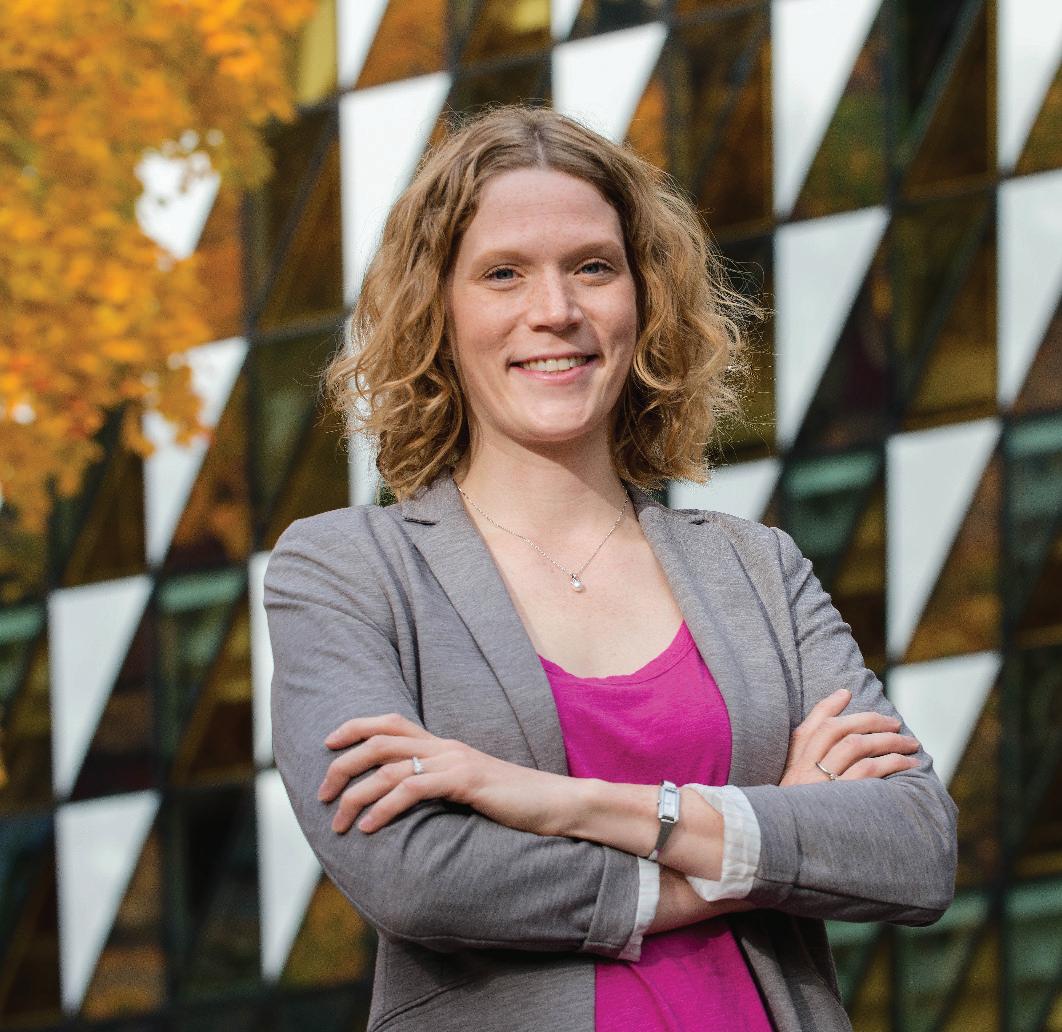
From a generation well known for their convictions and desire to serve, Gustie Millennials lead in powerful and unique ways. Whatever challenges the world faces, these alums will face them and remake them for the better.
The Simulation is Real
NURSING PROFESSOR LYNNEA MYERS ’05 IS HELPING TO LEAD GUSTAVUS AND OUR STUDENTS THROUGH THIS DEFINING PUBLIC HEALTH CRISIS.
BY STEPHANIE ASH
In January, professor and alum Lynnea Piotter Myers received an email from Rose Jost ’63, who was teaching the public health nursing course while Myers was on leave. Jost noted in the email a new novel coronavirus popping up in China. “I’m sure there are some very anxious public health folks these days,” she wrote. It was already going to be a busy spring. Myers was just back to the U.S. from Sweden with her husband, David Myers ’05, a toddler, a new baby, and a new PhD. There were so many other things to worry about, including her return to fulltime teaching. Myers took pause anyway. “She’s a wise woman,” Myers says of Jost, who is also the retired family health manager for the City of Bloomington. “I thought, maybe I should pay attention to this virus.” When another email showed up shortly after, this time from the leadership of the Gustavus Infectious Disease Committee asking Myers if she’d join, she paused again, then quickly said yes. A few short weeks later, Carol Brewer, director of Campus Safety at Gustavus, pulled This is the time to teach our students what’s happening in real life. out the College’s long-prepared pandemic plan at a committee meeting. “At that point I knew we were going to be teaching in a very different way this semester,” Myers says. The rest, as they say, is history, and it’s still in the making. >>>
Catch up with some of the latest Millennial alumni from the classes of 2020 and 2019, pages 20 and 37.
Myers’ academic pedigree is exceptionally decorated: one master’s, two doctorates, plus published research in public health, neuroscience and genetics, early childhood development, and nursing education. She’s also a first-generation college student from Gaylord, Minnesota, a rural community of just 2,000 people 25 miles north of Saint Peter. Gustavus was the only college she applied to, and like thousands of Gusties before her, “I thought I wanted to be pre-med,” Myers says. But the liberal arts worked its magic, and she found herself in a summer public health internship, and loving it. One day—in a cliché, made-forTV sort of way—she happened into the Career Center. “I literally read a brochure on nurse practitioners and thought, that’s what I’m going to do,” she says.
Myers knew little about nursing, but each step solidified her passion. “The major appeal was the ability to see patients right away,” she says, “and faculty in so many different areas encouraged me.” She had clinicals in diverse settings, from a pediatric medical-surgical unit at Children’s Hospital, Minneapolis to a public health rotation in Blue Earth County to a senior capstone at St. Francis Hospital in Shakopee. And then there was the undergraduate research she did with professor Barb Zust ’76, a study Myers designed herself and presented nationally. “That’s what piqued my interest in pursuing a PhD,” she says.
But first there was her master’s program at Duke, begun the same year she began nursing—an unusual acceleration. She became a very young pediatric nurse practitioner at clinics, Carver County Public Health, and the Minnesota Department of Health. She was only 28 when she returned to Gustavus to teach in 2011, where her old mentors simultaneously welcomed her and pushed her to think even bigger. The past eight years, she taught Gustavus courses in public health, nutrition, nursing concepts, medical-surgical nursing, pediatric nursing, clinical rotations and research in health sciences, and earned a PhD in Nursing Science at Vanderbilt University and a PhD in Developmental Neuroscience at Karolinska Institutet in Stockholm, Sweden.
She returned to Gustavus in January. And, well, we all know what happened next. • • • It is mid-April. Governor Tim Walz has asked all Minnesotans to stay home. The vast majority of students have left campus. All but essential employees work from home. Professors teach from home. The Infectious Disease Committee members meet from home, via Google Meet, at least three times a week.
Myers represents the faculty on the committee and provides public health insight and expertise as well. “Everything changes by the minute,” she says. She finds it all fascinating. Her front
Myers (center) with friends, clockwise from top left: Katrina Kleinwachter Fortney, Laura Palzer Dahlstrom, Amanda Olson Petersen, Megan Wille Miller, Anna Gutman Fisher, and Kelly McGillivray Kley.
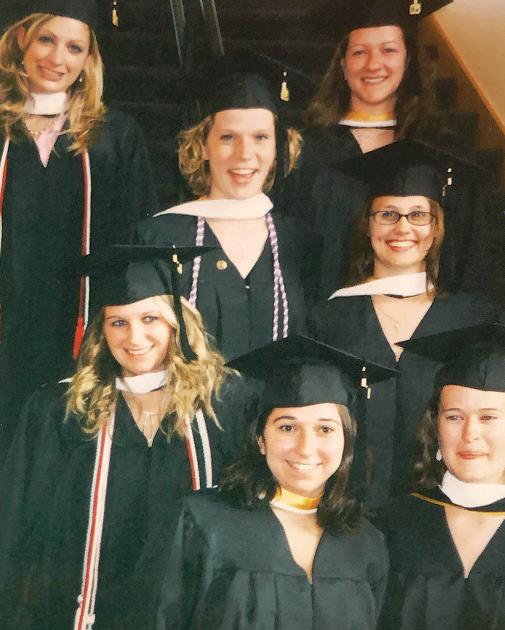
There are so many positive images of nursing and healthcare right now— people doing all they can to help others. Nurses are so passionate about their jobs and compassionate in their care, and our students are embracing those values.
seat to the Gustavus response to a global pandemic is both the culmination of her career so far and an immersive learning experience. “When I worked in public health at the county and state level, we talked about how disaster plans operate within different structures. It’s been so interesting to see how Gustavus has been planning for this all along.” The choices Gustavus has made, and their consequences, illustrate the importance of the public health imperative to keep people and communities healthy. Decisions cascade into other decisions: Which buildings to keep open, where to potentially quarantine a group, how to safely serve food, how to mitigate negative economic impact. It is a constant reminder, Myers says, of the need for a public health
lens on infectious disease, of “how you can’t just approach the medical and health side of a pandemic. You have to look at all of the things that affect an individual and a community.” • • • That’s exactly what her nursing and public health students are doing in her classes this semester. “Right now my thoughts are, how can I integrate this pandemic into learning experiences?” Myers says. Take, for instance, her Public Health Nursing class. “Our disaster simulation used to be a flood,” she says with an ironic chuckle. “We’re going to change that now.” Mining her deep contacts, Myers has engaged both her public health and senior-level nursing students in real-life, real-time COVID-19 response conversations with epidemiologists, public health nurses, even a health insurance expert. Gustie alum Gordon Mansergh ’84, a senior behavioral scientist at the U.S. Centers for Disease Control and Prevention, joined class one day. So did the disease prevention and control coordinator leading Nicollet County’s response to COVID-19. “She brought up what public health professionals would need to do to execute mass vaccinations,” Myers says. “That was eye opening for students.” Final exams in Intro to Public Health will have students collecting powerful images from the media that illustrate the current pandemic and reflecting on how various elements of public health have been influenced by the pandemic and influence the response to it. Senior nursing students will do a telehealth simulation for their finals—a virtual visit like many real-world providers are doing right now. Those senior nursing students in particular are eager to be a part of the healthcare workforce, to respond to the challenge of this global pandemic with innovation and compassionate care. Since all students in the nursing program are Certified Nursing Assistants, some have been working as CNAs throughout the program. Others are going into CNA or student (pre-boards) nurse jobs right now, or registering for such jobs, particularly at places where they are needed most, which also happen to be among the riskiest: nursing homes and long-term care facilities. “In challenging situations, I like to talk about the innovation that will come out of this, how people will approach life, jobs, education, health,” Myers says. “This will change how healthcare looks, how higher education looks. This will prepare students to be thinkers and leaders in their communities. This will move our students forward.” •
For more Millennial Gustie alumni in healthcare, see page 18.

NETWORK IN ACTION
Here’s who shaped Myers, and whom she’s shaping now.
• Barb Zust ’76
Myers had an undergraduate scholarship to conduct research with Zust, which led her to pursue advanced degrees and return to Gustavus to teach alongside her.
• Amy Leval ’97
A PhD nurse at the Karolinska Institutet in Sweden, Leval mentored Myers through her second PhD. She’s now Director of Alliance Partnership at Janssen Pharmaceutical Companies of Johnson & Johnson in Sweden.
• Eva Miller Christensen ’05
Roommates their first and second years, the two told each other they were going to apply for the nursing major on the same night in their room in Co-Ed (Norelius). Christensen now works in a cardiac clinic in the metro area.
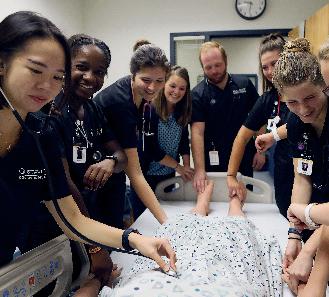
• Today’s nursing majors
Each cohort numbers around 30 students, so faculty and students develop close, meaningful relationships. Like Myers, all full-time faculty have PhDs; students conduct research with them and often present it nationally. Grads of the program go on to work in all areas of nursing.
Hands-On Living
JON SCHMIDT ’11—AKA JON THE POTTER—IS PART CERAMIC ARTIST, PART ENTREPRENEUR, PART YOUTUBE STAR, AND ALL GUSTIE.
BY SARA ASP OLSON
“What’s up guys? I’m Jon the Potter.”
It’s Jon Schmidt’s signature opening line, and it signals the start of a clay-throwing good time over on the Waconia, Minnesota native’s YouTube channel, where 115,000 subscribers regularly tune in to watch him craft mugs, bowls, and plates from his home pottery studio, which he then sells on Etsy and uses (and sells) at his other businesses, a chain of coffee shops in and near Waconia called Mocha Monkey, which he bought when he was still a student at Gustavus.
That’s a lot of seemingly incongruent activity. But when you see Schmidt in action—long, unruly hair; friendly, laid-back manner; next-day stubble; maybe a slouchy beanie—it all makes sense. He definitely looks like your supercool, coffeeshop-owning buddy who throws pottery on his YouTube channel.
That’s the thing about a liberal arts education: You come in thinking you’re just one thing—an athlete, an academic, an artist—and come out with a completely different understanding.
That’s what happened to Schmidt.
Growing up, Schmidt had been all about athletics, “basketball in particular,” he says. “That was really my whole story about myself.” When he arrived at Gustavus, he assumed that story would continue uninterrupted.
It did not.
Schmidt jumped into his management major, taking classes and building lasting relationships with the guys in Co-Ed (Norelius). He stayed sporty with JV basketball for a year, then intramurals and club volleyball and ultimate frisbee. He got better at writing—something he’d never been great at in high school— and began to develop a more complete picture of himself.
Then he went to India.
“It was a trip called Social Justice, Peace, and Development,” he says. It had nothing to do with his management major, but he felt compelled. And when he came back, “I had a whole new perspective—about living a life that you love, about not chasing the most money, about seeking adventure and carving your own path.” Engaging that sense of adventure, he signed up for a ceramics class. There, with encouragment from a professor who gave him free reign on studio time and materials, “I realized that I had something that I wanted to do for the rest of my life.”
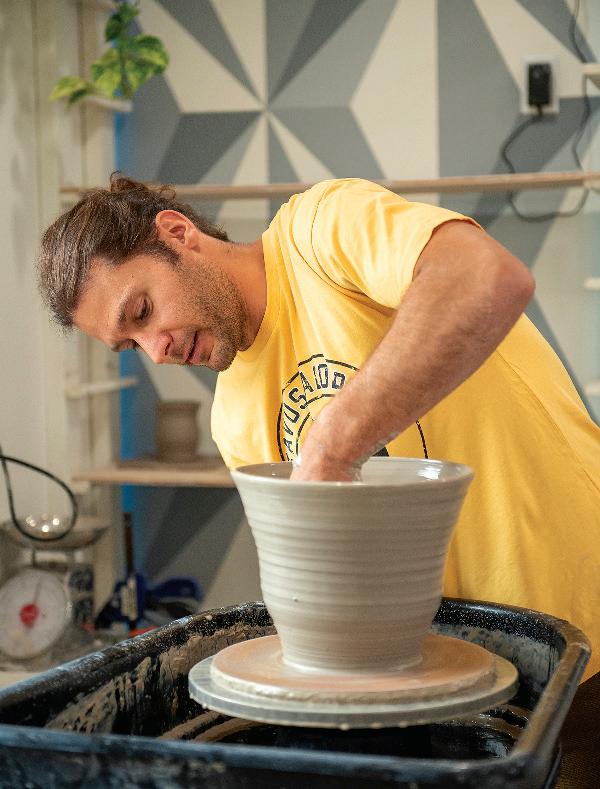

Schmidt has been growing Mocha Monkey for nearly a decade while throwing pottery part-time and selling in his coffee shops. Now, with the recent success he’s had on his YouTube Channel, and more recently his TikTok, the pottery is really hot. He can’t keep his Etsy shop in stock. Find him and his work on all three platforms as jonthepotter.
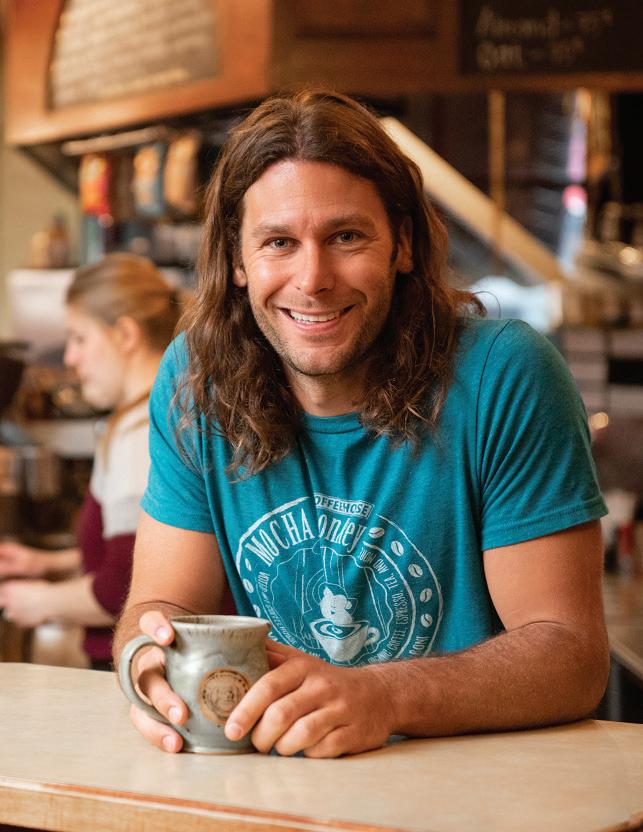
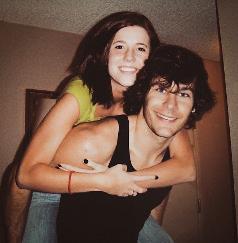

Schmidt met his wife, Elise Biewen ’11, in the first week of their first
year. The two were seated next to each other at the President’s Dinner. “I was definitely intrigued, I thought he was very good looking,” she says. “I found out very soon that he was also a basketball player and that was the immediate attraction to each other. The rest is history, I guess.” The couple now have two young sons, Ryder and Rory, Class of 2039 and Class of 2042. • • • By the time senior year rolled around, Schmidt had moved away from his sporty high-school persona, picked up some business skills, traveled to India and back, and developed a passion for pottery. Then it all came together.
“I walked into this coffee shop near my hometown, Mocha Monkey. [They were] using handmade pottery every day behind the counter: mugs, plates, bowls…” he says. There, in the basement, was ample room for a pottery studio. “Everything kind of collided for me: my passion around ceramics, a vibrant business in a community that I really love.
“So, I got a job there.”
Schmidt was still taking classes at Gustavus when he became a Mocha Monkey barista. Then, in December 2010, six months before graduation, the owners wanted to sell.
Schmidt was 21. He had few financial resources. That didn’t stop him. “When I have a vision for something I really stop at nothing to go after it,” he says. Plus, “My Gustavus experiences gave me the confidence to jump in.” Still, there was his senior year to finish. “I went to some of my business professors and asked, ‘is there any way I don’t have to actually be at Gustavus, that I can be running this new business?’” he recalls. Absolutely, they said. What better way to practice hands-on business skills then owning a real-world business? He secured a loan, worked out independent studies based on his business launch, and dug in.
The support was immense. Schmidt’s new venture became a learning lab for himself and his fellow students too. “Gusties helped me make logos and branding for Mocha Monkey. My business showed up as case-study projects in all sorts of classes. Gustavus as a community was able to actually help me start this business and get it off the ground.” • • • Mocha Monkey now has three locations in and around Waconia, including an innovative location inside a local bank (complete with a drive-thru). Schmidt just earned his silver YouTube button for six figures worth of subscribers. His Etsy inventory regularly sells out. This guy who learned how to write while at Gustavus just landed a book deal. This is nothing like the life a sporty, firstyear Gustie Jon Schmidt envisioned for himself—there’s narry a basketball hoop to be found. “Gustavus allowed me to discover things within myself that I never would have found otherwise,” he says. The outcome almost 10 years later is the best of all his worlds: “a life that I’m ridiculously passionate about.” •
For more Millennial Gustie alumni in the arts, see page 19.
MILLENNIAL GUSTIES: Healthcare
Cheers to these Millennial alums caring for us. (And thanks
to all other Gusties doing the same.) BY JJ AKIN ’11
Stephanie Hardel Krautkremer ’11
Biology major/neuroscience minor,
Nurse, cardiac/surgical ICU (now a
COVID-19 ICU) at North Memorial
Hospital in Robbinsdale
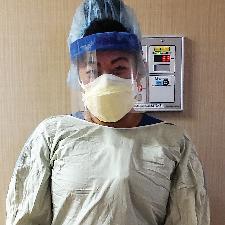
As of April 13, her unit was completely filled with patients who were positive for COVID-19 or likely so. She’s been using her undergraduate coursework in my biology and physiology daily, as well as the leadership and critical problem solving skills she developed at Gustavus, which are needed to adapt to the current pandemic. And then there’s her desire to create a sense of belonging among her coworkers. “Building close-knit relationships at work like the ones I built at Gustavus have helped prepare me for this crisis,” Krautkremer says. “Now, more than ever, we have leaned on each other for help and support.”
Brian Berglund ’08
Biology major, Chief internal medicine resident, Abbott Northwestern
Hospital, Minneapolis
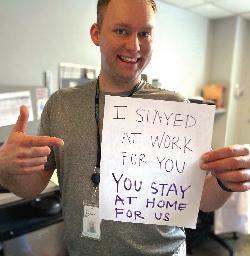
“People are scared,” Berglund said in mid-April. His focus is split between treating COVID-19 patients to protecting hospital personnel. As a chief resident, he takes care of admitted patients and performs administrative duties such as communicating policy and providing education on guidelines. Through Gustavus football, Berglund learned “the strength gained from being part of a team working towards a common goal,” he says. Through the academic rigor at Gustavus, he learned to be steadfast. “That’s been helpful in piecing together the things required to understand and treat this illness.” The Gustavus sense of community gave him respect for the needs of the group over the needs of the self. “We’re all in this together now. This isn’t just about doctors and nurses—everyone has to come together to make this work.”
Ben Biewen ’13
Biology major, Emergency
Medicine Resident, Bellevue
Hospital/NYU Langone,
New York City
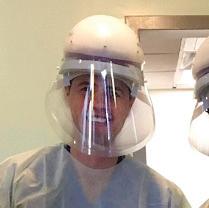
After moving to NYC last June, he’s been in month-long rotations in different emergency units at Bellevue and NYU. He was in pediatric emergency in January when he began hearing about the novel coronavirus, and rotated into ICU, “right as things were ramping up,” he says. Pretty quickly, the work was strictly taking care of COVID-19 patients in negative pressure rooms, or suspected cases waiting for test results. As of mid-April, he was in ER. His Gustavus-honed work ethic has kicked in hard. “My head’s still down, just working day to day to do whatever I can to provide the best possible care for my patients.” It’s tough, but this Gustie chose emergency medicine for a reason. “I like that we’re always asked to use high-acuity problem solving,” he says. Plus: “Being the first person the patient sees is an opportunity to care for them by being knowledgeable and comforting in a difficult time.”
FOR RECENT ALUMNI
As a group within the Gustavus Alumni Association, they are graduates of the past 10 years. These Gusties have distinct needs and interests, defined by the generation and their particular time at Gustavus. And they have their own leadership. The Gustavus Recent Alumni
steering committee offers programming throughout
the year in the Twin Cities, providing opportunities to connect socially with one another and the College. For those living outside of the metro area, the College offers additional resources to help recent alums connect to the greater Gustavus community. Are you a recent alum? Join the Gustavus Recent Alumni Facebook Group.
FOR ALL GUSTIES
Gusties love helping other Gusties, and that extends to career support and networking. Our long tradition has become more formalized recently. Gusties Connect facilitates professional connections through peerto-peer career assistance for current students and graduates of all ages. From resume review and mock interviews to discussion forums and one-on-one connections, Gusties in any industry and career stage can benefit. Join in: gustiesconnect.peoplegrove.com.
MILLENNIAL GUSTIES: The Arts
Gustavus gave these creators a foundation for excellence, and
innovation in creative expression. BY MARA KLEIN

Alex Messenger ’10
Studio art and English major
Marketing and communications specialist at St. Luke’s Hospital, Duluth and author, The Twenty-Ninth Day
Messenger was on day 29 of a 600-mile canoe trip in the Canadian wilderness when he was mauled by a grizzly bear. Last year, he released a memoir of the attack and the quest for survival that followed. The TwentyNinth Day has been met with much acclaim as a finalist for the 2020 Minnesota Book Award, an Outside magazine Pick of Best Winter Books, and a Midwest Indie and Wall Street Journal Bestseller. Telling such a personal story was an enormous challenge and one that his liberal arts education prepared him well for. “Regardless of the task that comes up, I feel I have the vision, skills, experience and the problem-solving ability to take it on,” he says. “The opportunity to apply those skills comes up more than you’d think.”
FOR SOON-TO-BE ALUMNI
Current students benefit from a $10 million grant
to the Center for Career Development, which has implemented and augmented several programs
during the past four years. Gustie students receive counsel on life beyond the hill while still on the hill, in the form of more than 200 career events and fairs, 77 faculty and staff trained as career and vocation champions, and a Career Interest Clusters model that provides individualized guidance based on students’ areas of interest (business, education, health professions, government and social services, arts and communication, and STEM). Of the Class of 2019, 73 percent selected a cluster, and 76 percent completed some form of experiential learning. Thirty percent participated in the Gustavus Mentoring Program, which pairs a student with an alum in their area of interest. At
the time of their graduation, the average, self-reported career readiness score of the Class of 2019 was 3.87
out of 4. How are they doing now? Find out on page 37.
Samuel Grace ’11
Music performance major, Artistic Director, MPLS (imPulse) and doctoral student in choral conducting at Indiana University
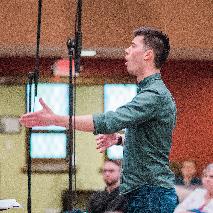
Grace is re-inventing the traditional concept of a “choir” with his innovative, semi-professional ensemble, MPLS (imPulse). Founded by Grace in 2014, the group brings choral music to surprising venues—a planetarium, a local swimming pool, and a cooking class where participants create food paired to the pieces. Some of his biggest supporters includes Gusties who have performed in the choir, served on the board, and packed the audience at concerts. Grace’s liberal arts background has provided him with a leg-up beyond musicianship. “Don’t underestimate the power of a liberal arts education,” he says. “I feel better prepared for my graduate studies in music because of the Latin, geography, French, and world religions courses I took at Gustavus.”
McKayla Murphy ’16
Communication studies major, dance minor, Girl Scouts River Valleys, Program Manager for the Girl Scout Leadership Experience
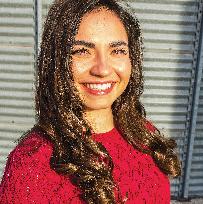
Murphy has paired the Department of Theatre and Dance’s focus on social change and inclusiveness with curriculum creation from her communication studies major and merged it into a career that includes both. As a racial justice development specialist at the YWCA in Mankato, she helped facilitate dialogue around racial equity through events and programming. Now she is a program manager for the Girl Scouts, leading civic engagement programming for young women. She also teaches dance in a community education setting, expanding access to new dancers and focusing on creative expression. She sees her many roles—teacher, communicator, mentor, leader— as part of a whole self. “It didn’t ever feel like dance and communication studies were competing with each other; it felt like they were expanding one another,” she says. It’s real-life evidence of the benefits of a liberal arts approach. “My areas of study overlapped all the time at Gustavus, and they continue to overlap all the time in my life now.”
Felton, Bachman, Nguyen, Araya, and Coe as first-years in fall of 2016.
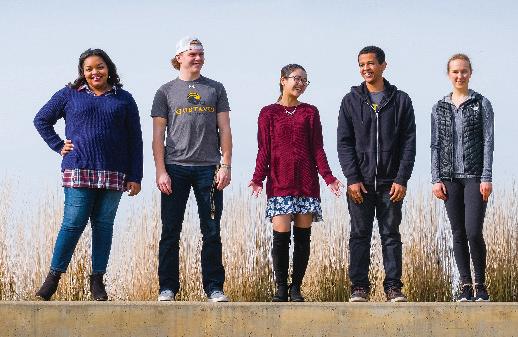
THE YOUNGEST ONES, FROM THE HISTORIC CLASS OF 2020 We’ve followed these five since they were first-years. Welcome to the other side of the Gustiehood, new alums!
Alice Lan Nguyen
Four years ago: Her friend base was mostly fellow international students. She was surprised by how much her professors cared. Her dream job was in hotel management and her student employment in audio-visual production. She eagerly awaited her first snow.
Today: She will graduate with a financial economics major and a statistics minor; her dream job is now equity analysis. She’s worked in the Office of Advancement as well as the English, Modern Language, and Scandinavian Studies departments. She’s also an economics tutor. Her profs still impress her. “But I am a lot more active now in class. Freshman year I would be quiet if I didn’t understand but I had courage to go to office hours to ask. Now I talk in class, put a question right out there.” Her friendships are mostly interest-based and American now, and she has an American boyfriend. “As I’ve settled in, the way I talk to others, share, has also changed. I understand more.” That first snow? “It was beautiful and magical. And then…” (She laughs.) “Well, I still think snow is beautiful to look at.”
A message for next year’s first-years: “Pay attention from the beginning. Don’t let that first year just drip away. If you don’t seize opportunities, you miss out.” Aleah Felton Four years ago: She was wow-ed by the Gustavus Choir and excited for her role in Sweeney Todd. She tried the Caf snack her Gustie brothers liked (chocolate ice cream with chocolate sauce and a banana), and made friends in her FirstTerm Seminar. Unsure of a major, she was “excited to be on this journey.”
Today: That first year she juggled choir, the musical, and an a cappella group—all on top of classes. “Like a true Gustie, I said yes to everything. But I learned from my mistakes!” she says. Her sophomore year, she honed in on education as a major and is now focused on teaching high school literature. Though her student teaching was cut short, “I’m definitely excited to be in my own classroom,” she says. “I love the discussions you get to have with students. I just got to grade 33 ninth grade research papers and these students went all in.” She still holds onto those group chats from her FTS, and she is still besties with the first person she met on campus, but friendships are more purposeful now—fellow choir members, education majors, and The world? Collegiate Fellows. She is most proud It’s huge. —Aleah Felton of her academic success. “Being on the Dean’s List multiple times, being a part of the International Honor Society for education, I achieved higher than I thought I would.” And G Choir? “It still shocks me on that first day of rehearsal. We’re the Gustavus Choir for a reason,” she says. Her signature Caf creation is warm chocolate cookies with vanilla ice cream. Still excited to be on this journey, she’d next like to be hired.
Words for next year’s first-years: “It’s okay to say no. At the end of the day, if you’re not taking care of yourself, you can’t take care of others. You have to be a priority in your own life.”
Words for alumni: “I’ll be one of those alums at CinCC who sits as close to the front as possible, holding your hand, singing ‘O Come All Ye Faithful.’”
NOT THE FINALE THEY EXPECTED
“I never imagined having my spring semester cancelled because of an epidemic,” Bachman says. Yet by mid-March, most students had gone home and online, with all sports, performances, and activities cancelled. A month later,
Stephanie Coe Four years ago: She was a competitive figure skater from Washington state looking forward to getting to know Minnesota. She delighted in being able to study music and explore her faith while pursuing pre-med. Her boyfriend’s cousin was her roommate.
Today: “I got hired!” says this nursing major. She’ll be at University of Minnesota Children’s, where she did her senior year clinical. “Having a job in the Cities is going to be awesome,” she says, “though my parents are a little sad I won’t be heading home.” She will take grad-level courses while she works, and continue her collaborative research with the Gustavus nursing and dance departments, creating a science-art performance piece for the upcoming Nobel Conference. She’s still skating, still with an eye on Disney on Ice. The figure skating club, which has been a unifying source of diverse friendships, has gained numbers. As far as other relationships, “I don’t have the same boyfriend, but I still have the same roommate,” she says. In fact, she’s still close with many of her first-year friends. And she’s close with her professors. “I never imagined I would have the support and connection and guidance that I did,” she says. The bumps in the road? She’s better for them. “Just navigating this whole journey has allowed me to see these strengths in myself, to have confidence that I can lead, and in a productive and genuine and compassionate way. It’s a unique leadership personality that comes out of Gustavus. It’s real leadership.”
Words for next year’s first-years: You will change, but you will remain the same. You don’t have to give anything up and you shouldn’t. You will become more of who you were meant to be.
* We weren’t able reach Christian Araya > before he left campus, but we know that in four years he kept the same roommate, changed majors from biology to psychological science and political science, and discovered a love of visual art. Avery Bachman Four years ago: He was pumped to compete in football and had tentative plans to pursue a physics major and participate in the Fellowship of Christian Athletes. Between class and practice, he was also looking for a nap.
Today: He’s a three-year starter on a team that took it to the fourth quarter in every game. “My biggest takeaways from football are the mentorships from coaches and others and countless opportunities to lead everyday—even as a sophomore.” He will leave connected to more than 200 teammates. As for that physics major: “I had a reconsider moment,” he says. The work was more intense than his commitment. “There were many other things I could do to As grads, we’re be equally as happy,” he says. prepared to get a job, but we’re also ready to lead, be innovative, attack He switched to management with a physics minor and has no regrets. Though he didn’t keep up with the Fellowship of Christian Athletes, he did change, and keep participate in devotionals swinging. held by coaches. Most —Avery Bachman importantly, he says, he learned to love the process of improving, not the outcome, and to find common ground with all different kinds of folks. “The impact of that didn’t resonate with me until junior and senior year,” he says. “Just understanding where people come from, why they think what they think. It was a challenge, but it was awesome. You don’t know what any new relationship can do for you.”
Words for next year’s first-years: “It’s easy to be passive, but you’ll never be more immersed in knowledge and people who care about you then when you’re at Gustavus.”
Words for fellow alumni: “I don’t think the school could have done a better job preparing me for life to come. I’m ready to kill it.”
Commencement was postponed. Still, these are Gusties. They can frame their disappointment as a path toward growth. “I am stronger than I thought and weaker than I thought,” says Nguyen. Hardship “makes life more memorable.” Even though it’s temporary, “It was hard to say goodbye to my friends,” says Felton. “But the memories, the bonds—they don’t end at graduation.” And then there’s the long-game perspective on this global pandemic. “It’s history in the making,” Felton says. “And we have the opportunity to plant ourselves in the middle of it, to document it, to show that we were here.”







